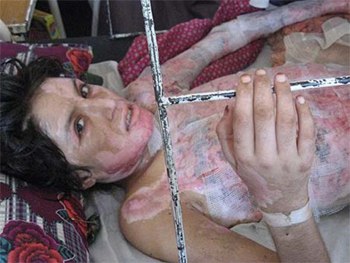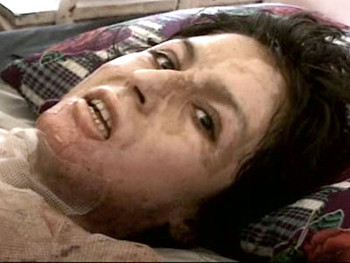Paul Workman
KANDAHAR — She was once an attractive girl. Her husband's family paid the equivalent of about $7,000 as a dowry, and at the age of 14, Bora Gul Heha was sent off to get married. She was strong and healthy and would provide the family with many sons and daughters.
Her husband Abdul was older, in his twenties. The first time he saw his new bride was on their wedding night.
RAWA Video Clip of self-immolations in Afghanistan
It was also the first time he beat her.
Two years later, Bora is lying in a hospital room in Kandahar City, her body thin and disfigured. Mutilated.
There is little modesty as covers are pulled away to reveal the extent of her burns. A layer of gauze covers her torso. It looks raw and unbearably painful. Her face is burned, her back, her legs, almost her entire body.
Her mother stands helplessly by the bed, and mutters mournfully through tears.
"I am so sad when I see my daughter."
It happened so suddenly. In a fit of anger and desperation, Bora grabbed an oil lamp, and poured its flaming contents over her body. Her husband didn't try to stop her. The idea was to kill herself, but instead of dying, she is now left to suffer not just the agony of her burned and scarred flesh, but the shame and dishonor she has brought on her family.
"When I get out of the hospital," she says, "I will go back to my husband's house because I don't want to defame my father's name."
There's so much that's horrible and sad and infuriating about this story. How to grasp the desperation it takes for a young girl to do that to herself. And here's what's even more disheartening. It happens very frequently in Afghanistan. Setting yourself on fire has become a common way for frantic young women to escape the daily torture in their lives.
Escape from the man who raped you. Escape from a husband who beats you. Escape from a marriage you don't want. Escape from accusations of dishonor and disrespect.

Bora Gull Heha, 16 years old, lies in a hospital bed in Kandahar. When the abuse became intolerable, Heha took what she though was her only way out. She grabbed an oil lamp and set herself ablaze. (CP PHOTO/Stephanie Levitz)
In the city of Herat, 90 women set fire to themselves last year. In the province of Farah, 36 in the first six months of the year. Double that number in Kandahar province, according to figures gathered by the Afghan Independent Human Rights Commission.
But why self-immolation, which seems like such a crude and brutal way to commit suicide?
A young researcher for a women's group posed exactly that question to 800 Afghans whose sisters, daughters or daughters-in-law killed themselves by fire.
"They said that when they take pills, they don't die, but when they set themselves on fire, they believe they will die. One hundred per cent."
And there in the bed lies Bora, who in her very short, miserable marriage already has a son. And a mother-in-law who was abusive. And she will go back to them, because in Afghanistan, there is no other choice.
"I am the daughter of a Pashtoon," she says.
"I have forgiven all of my husband's family, but I don't want other young girls to suffer like me."
Women's shelters needed
The director of Women's Affairs in Kandahar province cannot hide her sense of despair. Her name is Ruma Tareen and she is a brave woman. The last director of the bureau was gunned down just outside her front door.
Ruma sometimes takes abused women into her own home when they have nowhere else to go. She has a wide, warm smile and laughs when we arrive wearing Afghan costumes, as a way of disguising ourselves when we drive into the city.
Her first sentence is packed with wisdom and sorrow.
"My feelings about all Afghan women are painful," she says. "They are so backward in such a sophisticated world."

Bora Gul Heha tried to commit suicide by setting herself on fire. (CP PHOTO/Stephanie Levitz)
She has proposed the creation of a shelter for women like Bora who have nowhere else to go. It's a western concept in a furiously male society. Canada has offered to help, but the project is now stuck in the bureaucracy of a government ministry in Kabul.
She vents her frustration on the Canadians at the Provincial Reconstruction Team based in Kandahar.
"We are talking about this for the last seven months," she says. "But we haven't seen any results."
Ruma takes us over to the hospital to meet the director, Dr. Sherifa Seddiqui. Yes, a woman, who's wearing an elegant white shawl and makeup, very unusual for this country. She used to be head of surgery but gave that up to take over administration of the hospital.
"I will tell you one thing clearly," she says, "women in Afghanistan have gone through a disaster."
As an educated woman who lived and worked through the Taliban years, she should know.
"I've seen more than 50 cases of women who set themselves on fire," she says. "As a woman, I feel so sad."
Most of them die, but not so with Bora, who amazingly talks about missing her husband, and asks to see some photographs that a colleague has been taking.
She knows what her body looks like, but hasn't looked in a mirror since the day she tried to kill herself.
"This is the first time to see my face since it was burned," she says.
"And I am totally changed."



